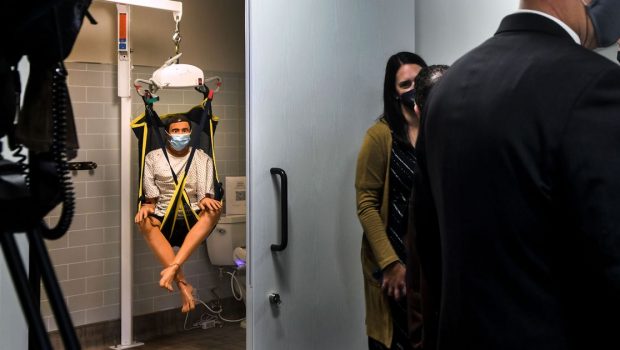WSU’s Steve Gleason Institute unveils new Adaptive Technology Center to help patients, families through neurodegenerative disease
Handless video game controllers. Voice-controlled devices. Wheelchairs you can drive with your eyes.
Those were just some of the advanced technologies on display Wednesday at an unveiling of the Washington State University Steve Gleason Institute for Neuroscience’s new Adaptive Technology Center in Spokane.
The center is designed as an information hub and a hands-on technological testing ground for adaptive devices to help patients suffering from neurodegenerative diseases and their families consider what they would like to incorporate into their lives.
The center will open Oct. 4. It’s by appointment only to start, partly to keep within COVID-19 regulations, said Theresa Whitlock-Wild, project manager for the Adaptive Technology Center.
“I wanted to create a welcoming area for families to come in and explore and try new things and learn ways to adapt their life to the disease,” she said. “Right now, research does not know what causes this disease.”
The Adaptive Technology Center is one of the three main components of WSU’s Steve Gleason Institute for Neuroscience.
The institute, formed in 2019, is dedicated to battling neurodegenerative diseases using clinical research, discovery research and adaptive technology. Gleason, the institute’s namesake, is a former WSU football and NFL standout who was diagnosed in 2011 with Lou Gehrig’s disease, also known as amyotrophic lateral sclerosis (ALS).
ALS is a progressive nervous system disease that deteriorates and ultimately destroys nerve cells in the spinal cord and brain, eventually causing loss of control with muscles, including those used with chewing, swallowing, speaking and breathing, according to the Mayo Clinic.
When clients walk into the building at 325 E. Sprague Ave., they will be given a tablet they can use to scan various QR codes throughout what Whitlock-Wild called the “tech tryout” space to learn more information about the technology on display.
Technology shown with Wednesday’s unveiling to the media included adaptive video game controllers, such as a “sip and puff” apparatus patients can control with their mouth, lips and breath. The center also showcased voice banking programs for patients losing their ability speak.
“We’re not pushing the product. We’re pushing the experience,” Whitlock-Wild said. “What do you still want to do and how can we make that happen for you?”
The building that houses the Adaptive Technology Center is owned by Avista, which – along with Providence St. Luke’s Rehabilitation Institute and Health Sciences and the Services Authority (HSSA) of Spokane County – was among the project partners involved in making the center happen.
“Years ago, when we started our investment in the South Landing … and we had this building as well, we said, ‘Perhaps this work is not purely about catalyzing buildings,’ ” said Latisha Hill, Avista’s vice president of community and economic vitality. “What if it could be about transforming lives today?”
The building was “pretty rough” when work got underway, said Daryll DeWald, chancellor of WSU Health Sciences Spokane. With help from more than $500,000 to $1 million in initial investment, developers transformed the space to include the tech tryout lobby, a kitchen space and a demo accessibility bathroom.
He said he expects the center to see clients from as far as Montana and possibly parts of Oregon, basing the projection on the service areas of Providence St. Luke’s and MultiCare.
DeWald said the finished space represents the project’s first phase, as the institute is seeking additional investment, donors and project partners to help support Phase 2. The second phase involves building out the rear of the structure to allow for more space to try out different adaptive technology.
Whitlock-Wild came into the project manager role for the Adaptive Technology Center in a much different place than where she was around seven years ago.
That’s when Whitlock-Wild’s husband, Matthew, was diagnosed with ALS. The diagnosis changed her family completely, making for a “huge learning curve” in how ALS affected life at home, travel plans, accessibility and everything in between.
So when she was asked roughly two years ago about becoming a part of the team to create the vision for the Adaptive Technology Center, Whitlock-Wild said she couldn’t say no.
“Helping these families to maintain their quality of life, or improve it significantly, through technology is the goal, but it’s just one goal,” Whitlock-Wild said. “We need to continue to educate and advocate, for students to learn about these diseases to take that knowledge and spread it out into the community. We need to help advocate for the families themselves and teach them the necessary tools they need.”








Gloss